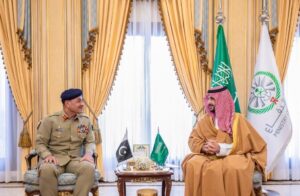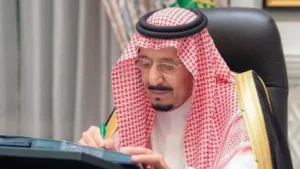IMF Applauds Saudi Arabia’s Economic Resilience, Vision 2030 Reforms and Non-Oil Growth Momentum

Riyadh, The Gulf Observer: The Executive Board of the International Monetary Fund (IMF) has commended Saudi Arabia for its strong economic performance, resilience to global shocks, and effective implementation of diversification strategies under Vision 2030. In its concluding statement following the 2025 Article IV consultations, the IMF underscored the Kingdom’s robust medium-term outlook, despite weaker global commodity prices and continued economic uncertainty.
According to the IMF, Saudi Arabia’s economic momentum is being driven by a thriving non-oil sector, which expanded by 4.5 percent in 2024—primarily led by retail, hospitality, and construction. In contrast, oil GDP declined by 4.4 percent due to production cuts under OPEC+, resulting in a total GDP growth of 2 percent. The IMF raised its growth forecast for the Kingdom to 3.6 percent for 2025, up from the earlier 3 percent projection, and expects GDP to reach 3.9 percent in 2026 as oil production gradually rebounds.
The Fund praised Saudi Arabia’s fiscal discipline, structural reforms, and continued investments as key factors enabling the country to balance fiscal stability with long-term transformation goals. Unemployment among Saudi nationals reached a historic low of 7 percent in the fourth quarter of 2024, while inflation remains contained.
Saudi Arabia’s foreign reserves remain strong, standing at $415 billion, equivalent to 187 percent of the IMF’s reserve adequacy metric. Despite a shift in the current account from a 2.9 percent surplus to a 0.5 percent deficit, the shortfall was effectively financed through external borrowing and reduced accumulation of foreign assets.
The IMF Board noted that non-oil GDP is expected to grow above 3.5 percent over the medium term, supported by major Vision 2030 initiatives and the hosting of significant international events. Among them, preparations for the 2034 FIFA World Cup are expected to inject up to $14 billion into the economy, alongside $26 billion in infrastructure investments.
Board directors highlighted the Kingdom’s progress in public finance reforms, particularly the adoption of five-year medium-term fiscal planning and the implementation of proactive expenditure ceilings. They also praised the stability of the banking sector, noting its strong capitalization, profitability, and low non-performing loan ratio of 1.2 percent in 2024.
Moreover, the IMF lauded the Kingdom’s modernized investment laws, which guarantee equal treatment for domestic and foreign investors, and emphasized the importance of attracting private investment to sustain diversification efforts.
The Fund emphasized the importance of maintaining structural reform momentum, especially in enhancing human capital, increasing female workforce participation, and strengthening the regulatory and business environment.
While acknowledging downside risks such as regional tensions, lower government spending, or weaker global oil demand, the IMF also noted upside potential from increased oil production and additional Vision 2030 investments.
In its concluding remarks, the IMF recognized Saudi Arabia’s growing regional leadership and constructive engagement in global platforms such as the G20, underlining the Kingdom’s vital role in addressing international economic challenges.


